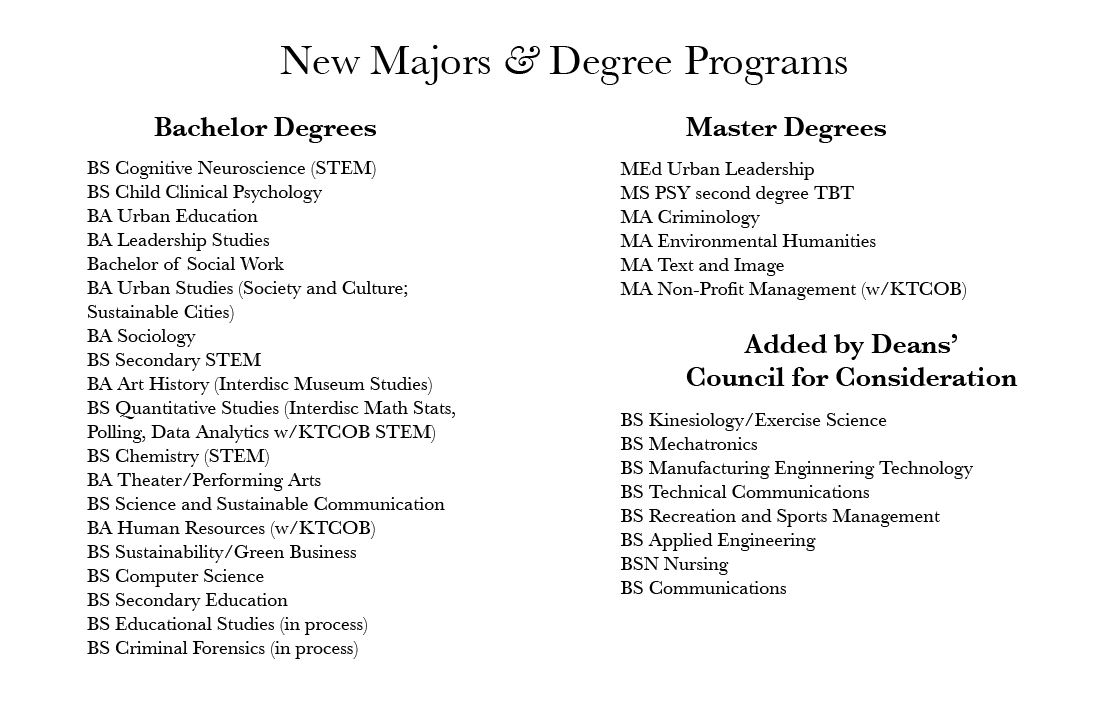Lofty goals such as the doubling of part-time job opportunities on campus, reducing the cost of textbooks by half and adding 25 new majors (see list below) to the campus are proposed in the Master Academic Plan.
Drafted by the Office of Academic Affairs, the plan establishes a framework for college and department growth over the next five years.
Created with a focus on university reform and direction, much of the 144-page plan has little relevance to student life. However, a few notable elements have a direct impact on the student body, and university administration is looking for feedback.
“We want students to take a look at this…” said Dr. Martin Tadlock, the university’s regional vice chancellor for academic affairs. “…and let us know if this sounds like something that would make us distinctively different as a university,”
The full plan can be found at the Office of Academic Affairs page on the USF St. Petersburg site. Comments on the plan may be given in person at the general assemblies of the SGA senate, or electronically through the USFSP student government’s webpage, said Tadlock.
The largest changes proposed by the plan affect the curriculum and community of USFSP. Based on the input from department staff and projected growth of current majors, the master plan proposes the revision and expansion of 35-degree programs and the introduction of 25 new programs and majors (see page 2.) An additional eight majors are slated to move online, alongside two degrees.
The action plan could also implement mandatory experiential learning into every department. By requiring 40 hours of community engagement activities for all students, the school hopes to infuse a hands-on element to degrees.
To foster democratic principles in the community, more public dialogues and open forums would be held to address issues facing the university.
Additionally, a daily common hour could be established where no classes are scheduled in order to section out a uniform time for exams and give more opportunity for student organizations to meet.
The curriculum is slated to become more commuter friendly with priority registration in online courses for non-residential students.
Lowering cost to current and prospective students is a major theme of the plan. Ambitious goals are set, including the reduction of textbooks and related learning materials by 50 percent.
Commuting students would benefit from the growth of online credit hours to half of the total to reduce travel expenses, while residential students would see cheaper and more plentiful housing options near campus.
The plan mentions concepts for three buildings and one office to be added to the USFSP campus in the distant future. To centralize and support themes of critical thinking, the Florida Center for Creative and Critical Thinking will be established. The Center would instruct faculty how to effectively teach critical thinking skills and foster the growth of these skills in students.
In order to apply these skills, the plan calls for the Office of Research and Sponsored Programs, where staff could better support the research efforts of undergraduate and graduate students alike.
A Center for Community Partnerships is also suggested, where volunteering outreach opportunities would be organized in one area. Internships, service-learning, consultation and university engagement programs will be offered in partnership with community figures and local educational institutions.
Lastly, the university plans to house the already established student support areas, such as COMPASS and the Student Success Center, into one accessible building.
Through community partnerships and university expansions, the academic master plan hopes to offer double the number of on-campus, part-time employment opportunities and paid internships. Semesters abroad would see an appreciable drop in price with a projected goal of less than $1,000 above regular USFSP semester costs.



